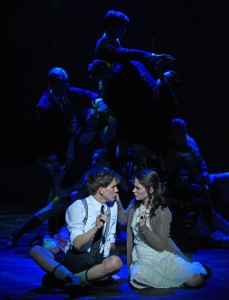By Jackie Marcoux
Image Credit: http://www.springawakeningthemusical.com/wp content/uploads/2014/05/066-kqkrya3-783×1024.jpg
The world has been viewing theater for hundreds of years. It started with the Greeks and the goal of teaching their communities life lessons. As the art form grew the goals shifted. Theater was a mode of entertainment; a place to go for a few hours to forget about the poverty that awaited you back home in 1500’s England. The goal of entertaining a crowd of people has continued into the present.
Today, we still wish to be entertained when we sit down in the theater but we are also prepared for more. We want to feel emotions and connect with characters who are different from ourselves. This idea has been utilized by some artists as a mode of change within the world outside of theater. I’m not exactly sure when the shift began but we are just starting to see its ripples.
For me it began with the musicalRENT. RENT brought a spotlight onto the issue of HIV and AIDS in a way that had never before been done. People were able to sing along with the songs and connect with these characters. We may not be diagnosed and dying of AIDS in the early 1990’s but we can certainly imagine we are and realize how important the issue is. A dialogue was started.
Then came Next to Normal, a musical about a family coping with a matriarch who has delusions of her dead son and is bipolar. This show paved the way for a discussion about mental health issues and the toll they can take on a family. There were conversations about whether or not people should be medicated in order to deal with the issue. The children of these parents were also focused on and questions about whether or not it is healthy for them to live with a parent that has a diagnosed mental illness. These questions and concerns didn’t just disappear when the show left Broadway. Every time the show is performed around the country these questions get thought about by the communities that see the show.
Currently on Broadway there are multiple shows continuing the idea of theater starting conversations and making impacts. The play The Curious Incident of the Dog in the Nighttime speaks to autism. The musical Fun Home deals with LGBT issues and suicide. Matilda is a musical dealing with abusive adults. Spring Awakening is a story of teens learning about sexuality in 1600’s Germany.
On a recent trip to New York City I was able to see Spring Awakening. In the current production of the show, originally staged by Deaf West based in California, the deaf culture has been incorporated into the show’s storyline. The entire production is done in American Sign Language and has selected certain characters as deaf. This adds a new dimension to the show because not only is it discussing young people discovering their sexuality in a world that tried to hide them from it but it also deals with being a deaf person, particularly at that time in history. It allows for conversations about sexuality, deaf culture, and the ability to be inclusive of all people who want to go to the theater.
Community Psychology is all about working towards addressing issues of social justice but that can only happen if conversations about those issues are started. Theater is no longer a vacuum where the viewer simply goes to be entertained. Viewers are being force to look at themselves and the world to find meaning in what they just watched. In order to find meaning those dialogues occur and may be begin working towards fixing the issue. Sure, some people will continue to go to the theater just to be entertained and to forget about the world for a little while. It is my hope though that more theater will be created that forces the viewer to think critically about an issue and potentially lead to positive change.
#commpysch
Jackie Marcoux is a graduate student in the Community Social Psychology program at the University of Massachusetts Lowell.

